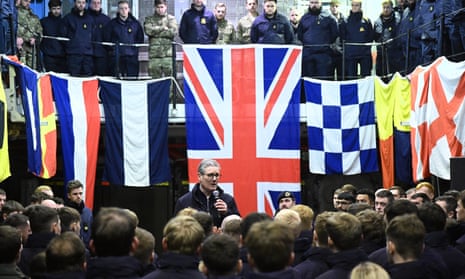Starmer says there is more to do on economy
Jessica Elgot
Keir Starmer has said that the economy is still a big concern, and he wants improvements “to be felt in the pockets of working people”. His comments came as UK inflation rose to an eight-month high of 2.6%.
Speaking in Estonia, Starmer told LBC:
We need to go further. We’ve stabilised the economy with the budget, but that’s not the limits of my ambition. I know we’ve got to do the tough stuff on planning, and we’re going to do the stuff, tough stuff on regulation. There’s more that we need to do.
But that growth, it can’t just be a line on a chart. It needs to be felt in the pockets of working people. I want people at the next election to say I feel better off, I know the health service is working properly now, and I can see a future for myself and my kids.

Asked how much his negative polling is worrying the prime minister, Starmer said:
What worries me and what gets me out of bed every day is how we deliver for those people who voted us in, in July to change the country for the better. How can we make them better off? How can I get those waiting lists down? How can we make sure that every young person has the chance to go as far as their talent will take them?
So, they’re the things that keep me awake. They’re the things I get up for in the morning. And look, I will be judged at the next general election, on whether I’ve delivered. I’m very clear about that.
Key events
Reeves: Government ‘taking action to address ongoing cost of living challenge’
More comments from the chancellor, Rachel Reeves, who insists inflation is “broadly in line” with other major economies and says the government is addressing the “ongoing cost of living challenge”.
She told broadcasters:
The inflation numbers today show inflation at 2.6%, that is comparable to other countries around the world, in the United States it’s 2.7% – so slightly higher – in the euro area, it’s 2.3%, so broadly in line with our international peers.
I recognise that the cost of living crisis continues to bite. That’s why in the budget, we increased the national living wage, a pay rise for three million workers, and it’s why we froze fuel duty so that motorists are not paying more at the pumps.
So we recognise the challenges that families remain under, and are taking action to address that ongoing cost of living challenge.
Starmer says there is more to do on economy

Jessica Elgot
Keir Starmer has said that the economy is still a big concern, and he wants improvements “to be felt in the pockets of working people”. His comments came as UK inflation rose to an eight-month high of 2.6%.
Speaking in Estonia, Starmer told LBC:
We need to go further. We’ve stabilised the economy with the budget, but that’s not the limits of my ambition. I know we’ve got to do the tough stuff on planning, and we’re going to do the stuff, tough stuff on regulation. There’s more that we need to do.
But that growth, it can’t just be a line on a chart. It needs to be felt in the pockets of working people. I want people at the next election to say I feel better off, I know the health service is working properly now, and I can see a future for myself and my kids.
Asked how much his negative polling is worrying the prime minister, Starmer said:
What worries me and what gets me out of bed every day is how we deliver for those people who voted us in, in July to change the country for the better. How can we make them better off? How can I get those waiting lists down? How can we make sure that every young person has the chance to go as far as their talent will take them?
So, they’re the things that keep me awake. They’re the things I get up for in the morning. And look, I will be judged at the next general election, on whether I’ve delivered. I’m very clear about that.

Heather Stewart
Here’s some instant analysis of the inflation figures by our economics editor Heather Stewart.
News that inflation ticked up to 2.6% in November has extinguished any lingering expectations of a rate cut this week – and there were some worrying signs in the detail for policymakers.
Transport was a key contributor to the increase in consumer price inflation (CPI) – the Bank’s targeted measure – with the price of a litre of petrol up by 0.8p a litre to 134.8p.
But while they have little control over global energy prices, the Bank of England’s rate-setters are likely to be more concerned at the increase in core inflation.
This measure, which excludes volatile food and fuel prices, continues to rise – up 3.5%, from 3.3% in October.
The Office for National statistics (ONS) highlighted recreation and culture as a factor here: including “cultural services,” such as theatre and gig tickets, and “games, toys and hobbies,” including computer games – suggesting consumers are continuing to pay eyewatering prices for a night out – or in.
The monetary policy committee (MPC) will worry that this evidence that the strong wage growth evident in Monday’s labour market data, while great news for the UK’s workers, is helping to put a floor under prices.
Services prices overall were 5% higher than a year ago, the same growth rate as in October.
The wider measure of CPIH, which is not targeted by the Bank but includes housing costs, shows that these are rising fast – with rents up a painful 7.6% in a year.
Economists expect inflation to continue rising into the new year.
This picture will add to the fears of some policymakers that the “last mile” of the battle to tame runaway inflation can be especially difficult.
Here’s more detail from the inflation snapshot.
Clothes retailers offered fewer discounts than last November, when they cut prices due to mild weather.
The ONS chief economist, Grant Fitzner, said:
Inflation rose again this month as prices of motor fuel and clothing increased this year but fell a year ago.
This was partially offset by air fares, which traditionally dip at this time of year, but saw their largest drop in November since records began at the start of the century.
Services inflation – closely watched by the Bank of England – held at 5%, rather than rising as analysts had expected, because of the big drop in air fares.
Rob Wood, chief UK economist at Pantheon Macroeconomics, said:
We think there is a good chance airfares will rebound very strongly in December.
Looking ahead, we expect headline inflation to reach 3.1% in April 2025 and stay at or above 3.0% until October 2025. We expect core goods price rises to tick up, reflecting somewhat stronger cost growth. Motor fuels inflation will boosted by base effects, and duty hikes will raise tobacco inflation. Inflation rising above the MPC’s target is one reason why we expect rate-setters to cut interest rates gradually.
The MPC will have to factor into their decision this week, and their new forecasts next February, stronger than expected inflation and wage growth, offsetting weaker GDP growth signals. Ultimately, services inflation remains too high to deliver headline CPI inflation sustainably at the 2% target, and rate setters need to be careful to keep inflation expectations anchored as headline CPI inflation rises.
We remain comfortable forecasting three 25bp rate cuts next year (February, May and November) and one more in 2026, but we are beginning to contemplate whether the MPC will respond to persistent inflation pressures by holding rates in February, instead waiting until May to cut again.
A lot rides on the MPC’s survey of pay settlements that will be published in the February Monetary Policy Report and whether the PMI is giving an accurate signal on growth, so the next GDP release will be key.
Ian Stewart, chief economist at Deloitte, warns that high wage growth and surging government spending could keep inflation high for longer.
The big declines in inflation are behind us. Next year inflation is likely to run closer to 3.0% than to its 2.0% target. Wage growth of over 5.0% and a surge in government spending could keep inflation higher for longer.
UK energy firms to spend £70bn to rewire grid
Jillian Ambrose
In other news, energy companies have promised to spend almost £70bn over five years to help rewire Britain’s electricity infrastructure in the global race to shift from fossil fuels to clean electricity.
The companies which own Britain’s high-voltage power system – National Grid, SSE and Scottish Power – have submitted spending plans totalling around £68bn to the industry regulator for the period from 2026 to 2031, which could support around 100,000 jobs.
The spending plans must still be approved by Ofgem which is expected to balance the need for costly investments in upgrading Britain’s power infrastructure to help meet its climate targets, which is paid for through energy bills, against the need to protect customers from rising energy costs.
National Grid set out plans to spend up to £35bn over the five years to March 2031, which could include investment of over £11bn to maintain and upgrade the UK’s existing networks, alongside building three major grid projects which have already been approved by the regulator through its fast-track process.
The FTSE 100 energy company has also proposed an investment pipeline of around £24bn; which includes around £15bn to increase network capacity, and a £9bn provision for any additional potential projects that the UK government may need to meet its 2030 clean power targets.
In good news for travellers, air fares fell by 19.3% on the month, compared with a fall of 13.9% a year ago.
Fares usually fall in November, but the latest drop was the largest November fall since monthly price collection began in 2001. It was largely driven by fares on European routes.
Prices in recreation and culture rose by 3.6% in the year to November, up from 3.1% in October, driven by dearer tickets for concerts and theatres, and computer games.
The biggest factor pushing inflation higher was transport, the ONS said.
Overall prices in transport fell by 1.1% in the year to November, compared with a drop of 2.0% in the year to October. On a monthly basis, prices fell by 0.8% in November compared with a fall of 1.7% a year ago.
The change in the annual rate was mainly the result of upward effects from motor fuels and second-hand cars, partially offset by a downward effect from air fares.
The average price of petrol rose by 0.8p a litre between October and November to 134.8p a litre, while the price of diesel rose by 1.4p a litre to 140.5p.
Rachel Reeves, the chancellor, said:
I know families are still struggling with the cost of living and today’s figures are a reminder that for too long the economy has not worked for working people.
I am fighting to put more money in the pockets of working people. That’s why at the Budget we protected their payslips with no rise in their national insurance, income tax or VAT, boosted the national living wage by £1,400 and froze fuel duty.
Since we arrived real wages have grown at their fastest in three years. That’s an extra £20 a week after inflation. But I know there is more to do. I want working people to be better off which is what our Plan for Change will deliver.
UK inflation rises to eight-month high of 2.6% in November
UK inflation rose to 2.6% in November, the highest in eight months.
It was up from 2.3% the previous month, according to figures from the Office for National Statistics, and in line with economists’ forecasts.
The core measure, which strips out volatile items like food and energy, increased to 3.5% from 3.3%, slightly less than expected.
The UK central bank is widely expected to keep interest rates unchanged at 4.75% at the end of its next meeting tomorrow.
Honda and Nissan to start talks on potential mega-merger
Last night, it emerged that Japanese carmakers Honda and Nissan will begin negotiations over a potential merger, according to reports.
The Nikkei financial newspaper said on Tuesday that the two Japanese companies would start talks to help combat the increased global competition from bigger electric vehicle makers.
The firms, which are the second- and third-largest car manufacturers in Japan, had combined vehicle sales of 7.4m vehicles in 2023 but are having to compete with soaring sales from Chinese rivals such as BYD and Li Auto.
Nissan shares jumped by nearly 24% in early trade on Wednesday.
A Honda spokesperson said a potential merger was among the possibilities being discussed. “We are discussing possibilities for cooperation between Honda and Nissan in the future, in a wide range of fields and in various areas, and those possibilities include the latest reports, but there is nothing decided,” the spokesperson told AFP.
Horsfeld has looked at what an increase in UK inflation could mean for interest rates:
If our forecasts are correct, directionally, this would not come as a surprise to the monetary policy committee: the monetary policy report forecasts factored in a 0.2%pt increase in CPI inflation between October and November. Even so, it would not be welcome to have the degree of overshoot in inflation outturns relative to their forecast widen.
The Bank’s official message has been that maintaining only a gradual pace of rate cuts from here still looks appropriate, with governor Andrew Bailey effectively confirming that means one 25bp cut per quarter. If inflation turns out as we predict, this would be an argument against stepping up the pace of policy easing, even if the UK faces mounting threats to external demand.
Introduction: UK inflation forecast to rise further above Bank of England target
Good morning, and welcome to our rolling coverage of business, the financial markets and the world economy.
Inflation in the UK is expected to have climbed to an annual rate of 2.6% last month, rising further above the Bank of England’s 2% target.
Figures to be released at 7am by the Office for National Statistics are forecast to show a rise in inflation from 2.3% in October. The core measure, which strips out volatile items like food and energy, is expected to have climbed to 3.6% from 3.3%.
The central bank is also worried about stubbornly high inflation for services, of around 5%, which is higher than in the eurozone (4%) and the US (3.9%).
Investec economist Sandra Horsfeld said:
It is hard to isolate a single factor, but a number of categories ranging from cars to airfares to recreation & culture look to have faced unhelpful base effects of their own last month. The same applies on the non-core side, where a non-repeat of November 2023’s automotive fuel price fall almost certainly added to inflation. Similarly, food price inflation, which had already surprised visibly to the upside in October relative to the Bank of England’s baseline forecast in its latest Monetary Policy Report, may have done so again.
Berenberg economist Andrew Wishart said:
Despite disappointing economic growth, inflation probably exceeded the Bank of England’s forecast of 2.4% in November. The rise in household inflation expectations in November will raise concerns that inflation expectations are drifting higher. And the increase in the output prices balance of the PMI survey in December suggests some of the increase in taxation on employment will be passed on to customers in the form of higher prices.
Inflation in UK services prices of 5.0% year-on-year is already an outlier compared to that in the eurozone (4.0%) and US (3.9%), and rising labour costs will ensure future declines are slow. As the drag on inflation from falling energy prices fades away, we expect headline inflation to rise to an average of 3% in the second half of next year.
Later today, the US Federal Reserve is widely expected to cut interest rates by a quarter point, to 4.5%.
Markets are eagerly awaiting the Fed’s summary of economic projections and comments from chair Jerome Powell for any clues on how aggressive the US central bank will be in reducing rates next year.
US retail sales increased more than expected last month, boosted by motor vehicle purchases, reflecting strong underlying momentum in a resilient economy.
Richard Hunter, head of markets at the investment platform interactive investor, said:
The near certainty of a 0.25% cut has seen speculation moving on to the accompanying comments, where the Fed’s outlook next year could be market moving.
Previously, four small cuts had been expected, but the residue of a strong economy and some potentially inflationary actions by the new administration could lead to the central bank sitting on its hands as it surveys the new economic scene.
Stephen Innes, managing partner at SPI Asset Management, said:
A quarter-point rate cut by the Federal Reserve is widely anticipated, but the trajectory beyond that remains murky. The resilience of the US economy could be tested by the incoming administration’s proposed inflationary import tariffs, which may cause Federal Reserve officials to reconsider the pace of future adjustments.
The Agenda
-
9.30am GMT: UK house prices and rents
-
11am GMT: CBI Industrial trends survey
-
1.30pm GMT: US Building permits for November
-
7pm GMT: US Federal Reserve rate decision, followed by press conference

